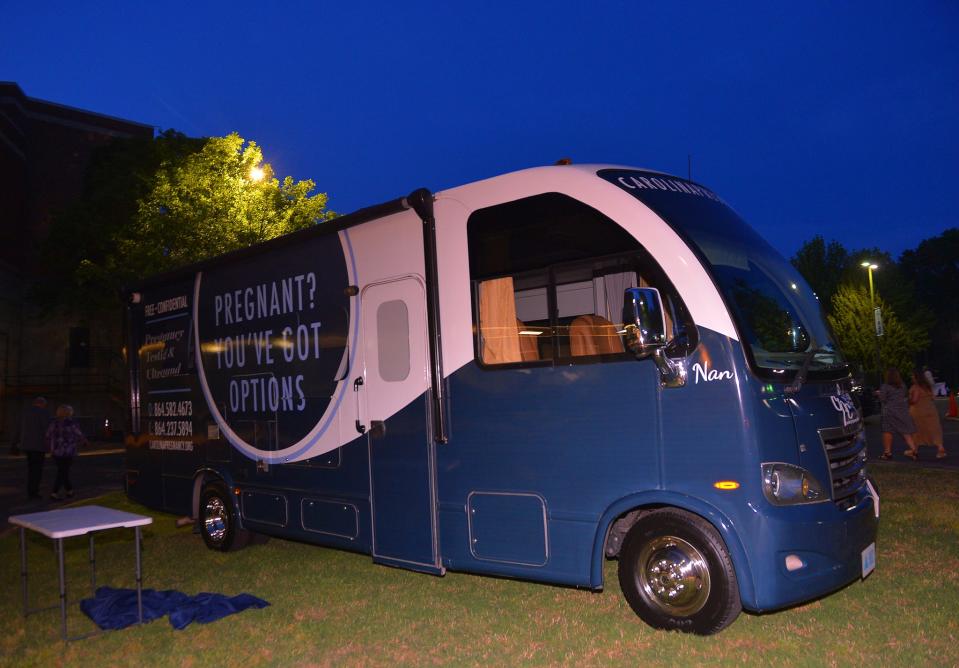Influence, funding grows for crisis pregnancy centers in SC. Here's what to know.
South Carolina lawmakers have used the past two budget sessions to allocate more than $2 million, every year, to various anti-abortion centers across the state. This year, they also switched their funding from a one-time allocation to being funded automatically every year.
Popularly known as crisis pregnancy centers (CPCs), these non-profit organizations are faith-based and encourage women against ending their pregnancy. They offer programs for families to access diapers, counseling, free pregnancy tests and limited ultrasounds. Many even offer free STI testing and assist with adoption services.
But public health experts and reproductive rights advocates said these centers often use deceptive practices to mimic medical facilities, disseminate incorrect information about abortions and downplay risks attached to childbirth to deter pregnant women from ending their pregnancy.
Lack of regulations raise concerns: SC gives medical contracts to crisis pregnancy centers.
These organizations have been around for years and often represent the grassroots arm of the pro-life movement. When Roe v. Wade was overturned last summer, pro-life activists across the U.S. began to envision an expanded role for crisis pregnancy centers as an alternative to abortion care.
Here's what to know about crisis pregnancy centers:
The origin of crisis pregnancy centers
Crisis pregnancy centers grew as a reaction to states wanting to decriminalize abortions. In 1967, Robert Pearson, a Catholic carpenter in Hawaii, established the first center after the state legislature moved to repeal anti-abortion provisions from state law.
In the next two years, Pearson moved to St. Louis and attempted to create a network of crisis pregnancy centers by establishing the Pearson Foundation. He trained local groups that wanted to start their own anti-abortion counseling centers. Perhaps the most consequential piece of literature he produced was the 93-page manual, How to Start and Operate Your Own Pro-Life Outreach Crisis Pregnancy Center.
The manual had recommendations for crisis pregnancy centers to masquerade as abortion providers and lure women through their doors. In 1994, Pearson's stance became clearer in a speech.
"Obviously, we’re fighting Satan ... a killer, who in this case is the girl who wants to kill her baby, has no right to information that will help kill her baby. Therefore, when she calls and says, 'Do you do abortions?’ we do not tell her, 'No we don’t do abortions,'" Pearson said in a 1994 speech.
The movement grew.
In the 1980s and 90s, hundreds of crisis pregnancy centers sprung up as offshoots of three major organizations: The Christian Action Council, later known as Care Net; National Institute of Family Life and Advocates (NIFLA) and Birthright International. These centers, which began primarily in Catholic circles, found a new lease among evangelical activists.
Today, they far outnumber the number of abortion clinics across the country.
South Carolina has three abortion clinics in Charleston, Columbia and Greenville. On the other hand, there are more than 35 crisis pregnancy centers operating in the state, according to a crisis pregnancy center map.
In 2021, the CPC database recorded over 2,500 anti-abortion centers across the country.

What services do crisis pregnancy centers offer?
They offer programs for families to access diapers, counseling, free pregnancy tests and limited ultrasounds. Many even offer free STI testing and assistance with adoption services.
Some anti-abortion centers also offer an "earn while you learn" program, where pregnant mothers are asked to enroll in Bible classes, one-to-one mentoring and religious counseling.
In return, mothers earn "mommy money" or "baby bucks" they can use to purchase diapers and formula.
How are CPCs funded?
Since the organizations are faith-based, crisis pregnancy centers often receive donations from churches and locals. Bigger centers regularly host fundraising events to expand their facilities.
Other avenues include the "Choose Life" specialty car tags offered by the S.C. Dept. of Motor Vehicles. Proceeds from the purchase of the tags are given to qualifying non-profits such as the SC Association of Pregnancy Care Centers.
Last year's budget was the first time "crisis pregnancy centers" appeared as a line item under medical contracts supervised by the S.C. Dept. of Health and Human Services. This year, the state refunded 20 crisis pregnancy centers with the exact same allocation as last year.
In the 2023 budget, SC Association of Pregnancy Care Centers is on track to receive $2.4 million. Meanwhile, the Pregnancy Center and Clinic of the Lowcountry will receive $50,000.
Devyani Chhetri covers SC politics for the Greenville News. You can reach her at dchhetri@gannett.com or @ChhetriDevyani
This article originally appeared on Greenville News: Influence, funding grows for crisis pregnancy centers. What to know.

